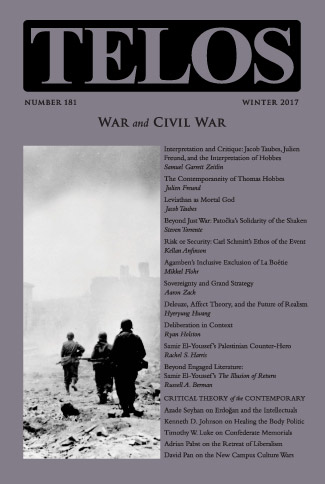Aaron Zack’s “Sovereignty and Grand Strategy: Some Observations on the Rise of China and Decline of the Americans” appears in Telos 181 (Winter 2017). Read the full article at the Telos Online website, or purchase a print copy of the issue in our online store. Individual subscriptions to Telos are now available in both print and online formats.
 The rise and decline of great powers are not solely material in nature but also moral, political, and cultural. Many modern theorists emphasize the material factors in rise and decline, but older political thinkers focused on moral-political explanations. Carl Schmitt defines the essence of the political as the distinction between friend and enemy. A rising sovereign will effectively distinguish between friends and enemies and act in the interest of a political community. A decaying sovereign will gradually lose its capacity to both make a rational distinction between friends and enemies and act in the interest of the (fading) political community. True grand strategy therefore depends upon a robust sovereign—a decayed sovereign faces difficulty in implementing an effective or optimal grand strategy. China is a rising power without an obvious universal mission or ethos. Nonetheless, China is governed by a robust and effective sovereign determined to advance China’s material national interests. A traditional geopolitical analysis suggests that America should act, if necessary, to prevent the emergence of a Chinese hegemony in East Asia. However, the American “sovereign” and polity are in a state of decay and, despite material wealth, lack the moral-political virtue necessary for the conduct of an effective grand strategy. Therefore America ought to accommodate China’s rise and primarily depend upon robust Asian sovereigns to limit Chinese power. Otherwise, the gap between the American sovereign’s fantasies and the reality of its decay will be closed by a swift military and geopolitical defeat.
The rise and decline of great powers are not solely material in nature but also moral, political, and cultural. Many modern theorists emphasize the material factors in rise and decline, but older political thinkers focused on moral-political explanations. Carl Schmitt defines the essence of the political as the distinction between friend and enemy. A rising sovereign will effectively distinguish between friends and enemies and act in the interest of a political community. A decaying sovereign will gradually lose its capacity to both make a rational distinction between friends and enemies and act in the interest of the (fading) political community. True grand strategy therefore depends upon a robust sovereign—a decayed sovereign faces difficulty in implementing an effective or optimal grand strategy. China is a rising power without an obvious universal mission or ethos. Nonetheless, China is governed by a robust and effective sovereign determined to advance China’s material national interests. A traditional geopolitical analysis suggests that America should act, if necessary, to prevent the emergence of a Chinese hegemony in East Asia. However, the American “sovereign” and polity are in a state of decay and, despite material wealth, lack the moral-political virtue necessary for the conduct of an effective grand strategy. Therefore America ought to accommodate China’s rise and primarily depend upon robust Asian sovereigns to limit Chinese power. Otherwise, the gap between the American sovereign’s fantasies and the reality of its decay will be closed by a swift military and geopolitical defeat.



